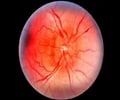Surprising discovery points to a potential target for treatment for diseases like multiple sclerosis.

‘Surprising discovery points on a growth factor receptor (called PDGFRA) offer a promising new direction for a therapeutic target against diseases like multiple sclerosis.
’





The study team found that overexpression of a growth factor receptor (called PDGFRA) in a mouse model did not cause tumors, as anticipated. Instead, severe hypomyelination was observed.
This manifested as impaired balance, and hindlimb and tail tremors in the animal. Drug Target for MS
“Our study provides a new model for studying hypomyelination. Blocking this receptor might prove to be a novel strategy to treat myelination disorders like multiple sclerosis. Of course, more research is needed to confirm our results and explore further,” says Dr. Becher, senior author on the study, Rory David Deutsch Malignant Brain Tumor Research Scholar at Lurie Children’s and Associate Professor of Pediatrics, Biochemistry, and Molecular Genetics at Northwestern University Feinberg School of Medicine.
As timing is very important in cancer development, the team pointed out that the current study focused on prenatal events, which is the reason the tumors did not form.
“We saw that too much PDGFRA interfered with differentiation of progenitor cells that give rise to cells that make myelin. These progenitor cells, which continue to be generated throughout the human lifespan, are known to be the cell of origin for brain tumors like diffuse midline glioma. Our findings suggest that the mechanisms we observed might spur brain tumor development at a postnatal stage,” says, Dr. Becher.
Advertisement








